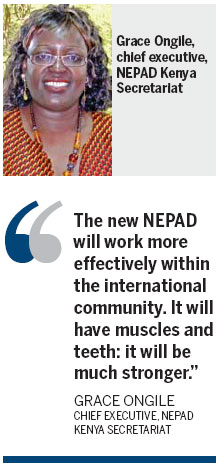News
New-Look NEPAD embraced by Kenyan officials
(China Daily)
Updated: 2010-05-03 07:13
 |
Large Medium Small |
Having spent valuable time researching and re-evaluating its role, the New Partnership for Africa's Development (NEPAD) is now even newer, and back with a wider mandate and a clearer framework.
The development body, launched by the Organization of African Unity - an earlier version of the African Union (AU) - in 2001, has been given a complete overhaul and will now focus more prominently on sourcing funds and implementing economic, social and political projects.
The former Nepad organization was largely seen as unwieldy and difficult to manage, but the NEPAD Coordinating and Planning Agency, formed in February, aims to rectify this by bringing all 20 NEPAD member countries under its supervision.

As Grace Ongile, the NEPAD Kenya Secretariat's chief executive explains, NEPAD's newly defined powers will allow its directives to be more coordinated and inclusive and the NEPAD member countries to be more accountable and proactive.
"Now NEPAD is under the AU umbrella, working in harmony and not apart from the AU, it will be discussed at every AU meeting. It will be able to strengthen its knowledge, information, sharing and research, which means it will work more effectively with the international community, and therefore attract more funding.
"The new NEPAD will have muscles and teeth: it will be much stronger."
NEPAD's primary objectives are to eradicate poverty; to place African countries, both individually and collectively, on a path of sustainable growth and development; to halt the marginalization of Africa in the globalization process and enhance its full and beneficial integration into the global economy and to accelerate the empowerment of women.
Ongile notes: "If we don't get the governance right, everything we talk about will go down the drain. Given our mandate of poverty alleviation, marginalization of the continent, enhancing women's voices, this transformation needs to be put into a context of frank speaking, and remain relevant to the country, the region and Africa.
"Knowledge and information sharing are of key importance in terms of infrastructure and agricultural policy. We will be working across all ministries to achieve our Vision 2030 goals," Ongile states. "The NEPAD Kenya Secretariat, which comes under the Ministry of Planning, has a new African Peer Review Mechanism with a 16-member council that will guide the process here."
In Kenya, the primary focus will be on agriculture, a sector that still receives less than the investment target of 10 percent of the national budget as mandated in 2004.
"Agriculture is critical to the development of the country, for our food security, and we must ally with Malawi to see how we can turn this around. Other practical programs in hand are connected to infrastructure.
"Whether we are talking about the Kenyan/Ugandan oil pipeline, the Port of Mombasa, Lake Victoria or highway linkage s to Ethiopia and Sudan from the north of Kenya, the future will rely on the economic regional community."
The CEO is hopeful about the potential for links with Chinese investors and businesses to make these projects a reality. "Business is very straightforward with China, but it is important that the skills and technology set is passed on to our people," she says. "I went to China last year, and was extremely impressed with the infrastructure there."
NEPAD lists the following as priority sectors: Agriculture & Food Security, Infrastructure (Water & Sanitation, Transport, Energy, ICT), Human Resources Development (Education and Health), Science and Technology, Trade and Market, Access Environment and Climate Change, and Culture and Tourism, Governance and Capacity Development and Gender Development.

(China Daily 05/03/2010 page23)







